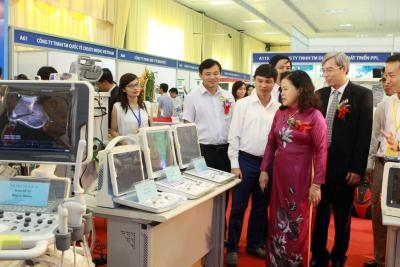The Ministry of Health has recently introduced a draft law on pharmacy which is expected to help address current shortcomings in management of drugs while boosting the development of the pharmaceutical industry.
The 98-article draft, which would replace the 2005 Law on Pharmacy, proposes four policies on state management of the pharmaceutical sector.
 |
| The annual International Medical-Pharmaceutical Exhibition was held by the Ministry of Health in Hanoi in May__Photo: Duong Ngoc/VNA |
First, it is necessary to ensure sufficient supply of drugs of good quality and reasonable prices in conformity with disease patterns to meet people’s heath care demand as well as security, national defense, natural disaster and epidemic prevention and control and other urgent requirements.
Second, the State would allocate budget capital while raising funds from other sources to boost the manufacture of generic drugs, vaccines, herbal medicines and pharmaceutical chemicals.
Third, domestically manufactured drugs would be prioritized for use in public hospitals and national health programs as well as in state budget-funded or health insurance fund-covered drug procurement plans.
Finally, drugs should be used in a reasonable, safe and effective manner, while clinical pharmacy and pharmacovigilance activities would be promoted, focusing on the training and retraining clinical pharmacists, thus contributing to improving the quality of medical examination and treatment services.
The draft devotes one chapter (Chapter II) specifying measures and policies to develop the pharmaceutical industry.
Accordingly, investment projects to manufacture active pharmaceutical ingredients and excipients from domestically available materials, generic drugs, vaccines, biological products or herbal medicines; to nurture medical plants or animals; or to conserve genetic resources as well as rare and precious species of medicinal plants and animals would be entitled to tax, land and credit incentives. Besides, projects on research into and manufacture of generic drugs, vaccines and preventive and curative biologicals would also receive investment supports in the terms of access to financial sources, human resource training and technology transfer, among others.
The draft law is expected to be passed by the National Assembly at its 11th session scheduled for March next year.-






